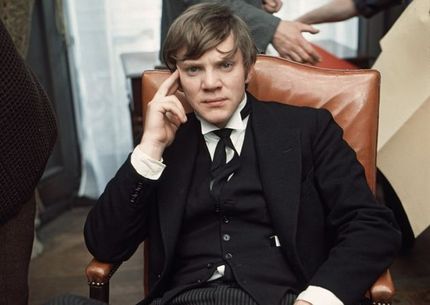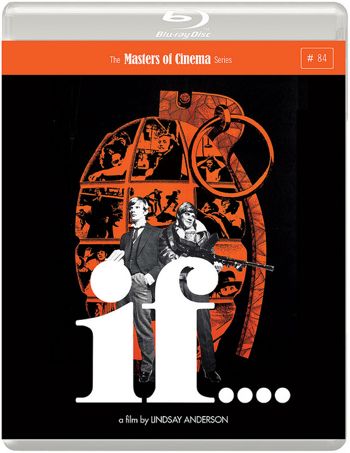Learning From The Masters Of Cinema: Lindsay Anderson's IF....

Before becoming a cinematic icon as Alex DeLarge in Stanley Kubrick's blistering adaptation of A Clockwork Orange, a cocky Yorkshire lad by the name of Malcolm McDowell made his screen debut as the equally rebellious Mick Travis in Lindsay Anderson's seminal If.....
A savage attack on outdated tradition and authoritarian regimes, If.... takes place in an archaic English public school, where the growing insubordination of a small group of rebellious students, led by Travis, ultimately explodes in a violent assault on the institution and its pompous leadership. That is not to say that the film in any way condones violence in schools, or should be reprimanded for depicting such scenes of celebratory mayhem. Anderson's film speaks to a larger notion of rebellion and anti-establishment sentiment that was embodied by the Anglican Church and these insular breeding pens for the British Empire's future leaders.
For anyone who attended an English public school (a term that may confuse, as they are in fact fee-paying private boarding schools), there is more than a little familiarity to be found in the monotonous routines and pointless petty rituals that make up the boys' daily lives. Schoolwork itself plays a minor, insignificant role, eclipsed by building house spirit through competitive sports, fulfilling menial duties for older students, as well as frequent chapel services, CCF activities and ridiculous dormitory protocols.
Based heavily on their own experiences at Tonbridge School, David Sherwin and John Howlett's screenplay - originally entitled Crusaders - is a spot-on reminiscence of the minutiae that made up the long, cold wintry days in these grand, drafty buildings in the British countryside. Beyond the frustratingly intricate and meaningless rules and regulations of the establishment, the film also does a great job of detailing the many tiers of disciplinary hierarchy within each house and then the school as a whole, as well as examining the rampant bullying that went on and bizarre homosexual experimentation. They also cite Jean Vigo's Zero De Conduite and the films of Luis Bunuel as key influences.
It is quickly established that Peter Jeffrey's headmaster has little to no idea what is going on with his pupils, relying heavily not on his common room, but on the prefects - or whips - to keep him clued in. Likewise, Arthur Lowe's doddery old housemaster is a meaningless figurehead, wholly dependent on the knowledge, guidance and influence of the arrogant, sadistic Head of House, Rowntree (Robert Swann).

Travis, together with his loyal cronies Wallace (Richard Warwick) and Johnny (David Wood), are insignificant members of the Sixth Form. Of similar age to the whips, but totally devoid of power or responsibility. Curiously, Travis is able to go toe to toe with the the odious Denson (Hugh Thomas) in the classroom, but back at the house Travis is painfully at his mercy.
Whenever possible, Travis & Co escape the trappings of the institution - either literally or figuratively - to embark on all manner of ridiculous adolescent escapades, both real or imagined. They seek refuge amidst the bizarre chanting of Missa Luba's Sanctus, the bottom of a vodka bottle or by attempting self-asphyxiation. When they are allowed to escape the confines of the school grounds, the boys run rampant in the local town, stealing a motorcycle, harassing - and then seducing - a cafe waitress, or, in their ultimate act of defiance, mowing down whips, teachers and parents with machine guns and hand grenades.
Sometimes the boys are successful in their efforts to escape - and Anderson encourages the ebb and flow of reality and fantasy throughout his film by the arbitrary use of black and white in some sequences - but on other occasions they are less fortunate. In one particularly memorable, and brutal sequence, Wallace, Johnny and Travis are ceremonially caned by Rowntree, where it becomes clear Travis is being singled out for special treatment. But rather than put the lads in their place, it merely galvanises them into action, and when they uncover a cache of weapons during a hard labour punishment, their plan comes together.
Understandably, it took a while to get the film made, especially as its writers had no immediate connections within the film industry. Once the script was completed, Sherwin wrote blindly to a number of industry figures, and it was blind luck he managed to get the script to Seth Holt, an editor at Ealing Studios. Holt helped them get it to Nicholas Ray, who apparently loved it but was unable to direct it himself due to ill-health. Ultimately, Holt put Sherwin and Anderson together, and they were able to get the film into production, shooting at Anderson's own old school, Cheltenham - as well as some later scenes at Aldenham School.
When the film was released it resonated particularly strongly in France, where it screened in competition and won the Palme d'Or at the Cannes Film Festival. Arriving less than a year after the 1968 student riots in Paris, If.... clearly spoke to and for a generation that refused to be raised by outdated judicial structures that failed to evolve with the times and address the needs of its people. Nearly 50 years later, If...'s spirit of rebellion remains as strong, just and pure as it did back then, while also retaining its fantastical, absurd sense of fun.
Eureka Entertainment has put together an impressive package for its new Masters of Cinema release, boasting a gorgeous 1080p restoration overseen by cinematographer Miroslav Ondricek and a raft of supplemental features that put Criterion's current release of the film to shame. The audio commentary is the same, an amalgam of an extended interview with Malcolm McDowell and a traditional historical commentary from film historian David Robinson. There are new video interviews with producer Michael Medwin, writers David Sherwin and John Howlett, editor David Gladwell, production manager Gavrik Losey, camera operator Brian Harris, and actors David Wood, Hugh Thomas, Geoffrey Chater, Philip Bagenal and Sean Bury, all of whom speak with great affection about their experiences on the film and of working with director Lindsay Anderson. The release also includes three of Anderson's short films: Three Installations (1952), Thursday's Children (1954) and Henry (1955), as well as two U.S. trailers and a 52-page booklet brimming with new and archival writing from Anderson, David Cairns and actor Brian Pettifer.
All in all, this is an indispensable release of one of the great masterpieces of British Cinema.
Lindsay Anderson's If.... is available from the Masters of Cinema series on Blu-ray in the UK now.

Do you feel this content is inappropriate or infringes upon your rights? Click here to report it, or see our DMCA policy.





